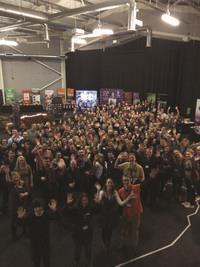
Hundreds descend on Eastbourne for Hand in Hand conference
‘Inspirational – I brought people with me to the event who I knew would benefit. I was not disappointed!’ This is how one delegate described this year’s Hand in Hand conference.
At the start of February, hundreds of children’s and families workers, both paid and voluntary, gathered in Eastbourne for the 2016 Hand in Hand Conference. They came from far and wide, with many delegates coming from overseas to take advantage of the main sessions, seminars and practical workshops.
The speakers on the main stage were the Bishop of Durham, the Rt Revd Paul Butler, and Terry Williams, from Scripture Union International. Seminars were streamed into different subjects: mission, the Holy Spirit and family ministry, as well as practical, hands-on sessions.
The Holy Spirit sessions were particularly appreciated, with five of the ten best attended seminars coming from that stream. One delegate said, ‘I really enjoyed the Holy Spirit stream – an aspect which has been underfocused in the past’.
Other popular choices were the sessions looking at the ‘Faithfull Generation’ initiative, launched by the Children Matter coalition. Faithfull Generation is a national conversation around mission, discipleship and children. Its aim is to help churches raise a faithful generation. Hand in Hand 2017 will take place on 3-5th February, so put the date in your diary.
The best book to read is the Bible

Lord Philip Wharton was passionate about getting actual Bibles into the hands of children so that they could read and study it – so in the 17th century he left a legacy to ensure the distribution of Bibles to future generations.
Today, the Lord Wharton Bible Charity continues to supply Bibles for under-18s who otherwise wouldn’t have access to their own copy. If there are children or young people in your group who haven’t got a Bible and would like one of their own to read and study, get in touch with the Charity’s clerk for details of how to apply. Email edwardsbobbarbara@btinternet.com
Mary Hawes is the national adviser for children and youth for the Church of England
Deep Impact 2016

Almost 300 delegates converged at snowy Aviemore in the highlands of Scotland in January for Deep Impact, Scotland’s Annual Conference for youth and children’s workers.
Kieran Turner, chair of Deep Impact 2016 said: ‘One of the special things about Deep Impact is the breadth of folk who come from every corner of Scotland. This year we had delegates from the Orkney Islands in the north to Dumfries in the south and from a great many denominations. It is a joy to see so many return year after year, willing to invest a full two days of their calendar into this event, eager to learn, grow, share and develop as well as spend times of quiet connecting with God, ready to return to their churches refreshed and better equipped for the year ahead. It really is a pretty remarkable time!’
Unhappy England
A recent report on childhood happiness by Children’s Worlds placed England 13th out of the 16 countries in the survey. The study, coordinated in England by the University of York’s social policy unit, was topped by Romania, Poland and Colombia.
Children were asked to rate how they felt about various key aspects of their life, such as family life, friendships and school, as well as overall happiness. While ranking highly in access to material possessions and the internet, English children seem to struggle with self-esteem and confidence.
Author of the report, Gwyther Rees, said, ‘Children are happy at home and with friends but less happy at school where there seems to be an issue around bullying and being left out.’
Modern Families Index
The third edition of the Modern Families Index, from Working Families, has recently been released. The index looks into the impact of work on family life and reveals some of the difficulties facing families in the 21st century.
This third edition shows that more and more families have both parents working full time, many of whom are putting in extra time just to get their job done. Burnout is a real possibility, particularly among Millennial parents (those aged under 35). In fact, those under 35 are more likely to take a pay cut to achieve a better work / life balance.
Male partners are doing more in the household, and increasing numbers of families are sharing caregiving, but traditional gender divides are still in place, both at work and at home. Women are more likely to be called upon when childcare breaks down and are more likely to do household chores when returning from work in the evening. To read the report in full, go here.
Ofcom’s children’s media report
In 2014, Ofcom began their study into children and young people, and their use of media in their lives. The three-year study follows the same group of 18 children, aged eight to fifteen, and maps the role of digital media in their lives. In January, Ofcom released its second-year findings.
The research discovered that children were using and consuming digital media more intelligently than many adults might think, with most recognising and shunning sponsored links on Google or pop-up adverts. Few of the group made in-app payments when playing tablet or smartphone games, preferring to go to the next free game. Many used digital media to help them with offline activities, with only those who had fewer (or no) hobbies using it as a time-filler.
There were some issues on whether websites were trustworthy, with most of the group assuming video was more trustworthy than text, as the content was more ‘transparent’. Few were able to see the links between advertisements and website content. Most of the sample only communicated with real-life friends on digital media, with any conversation with strangers being limited to specific video game discussion. Yet, digital media distorted or magnified existing offline social pressures. Girls seemed subject to image-focused pressures, while boys appeared to be pushed towards tough or laddish behaviour.
The report is rich in insight and, while the sample of children is small, the detail revealed is enlightening and likely to be useful in your children’s and families work. How can we help parents / carers to support their children in the digital world? For more details, see the full report here.











































